
By:
- Heather Buschman
Published Date
By:
- Heather Buschman
Share This:
Marching for Science
Members of UC San Diego community gear up for March for Science in San Diego and Washington D.C.
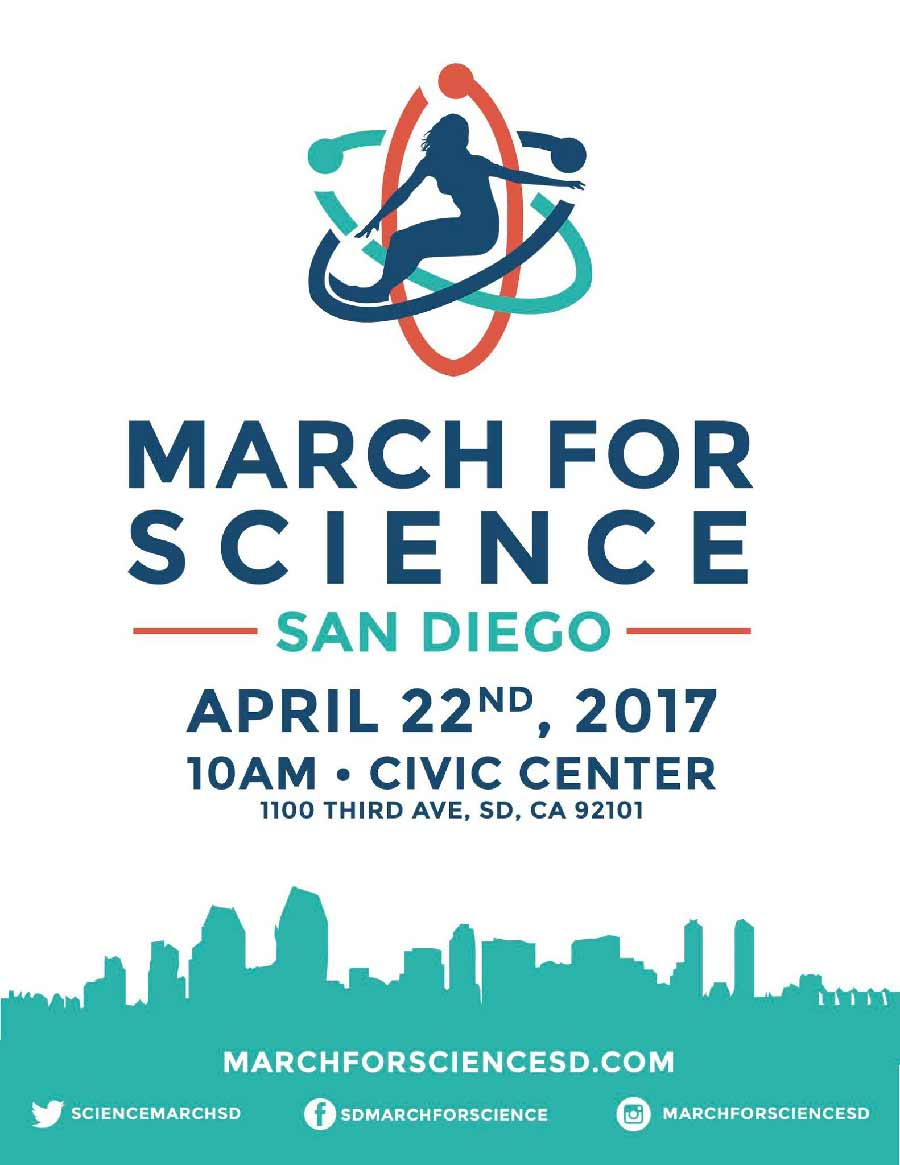
On Saturday, April 22, 2017, Earth Day, scientists and non-scientists alike will take to the streets in Washington, D.C., San Diego and many other cities to show their support for research funding, environmental protection, evidenced-based policymaking, and many other issues in a global March for Science.
It’s no surprise that hundreds of UC San Diego community members—representing just about every discipline—are planning to participate on their own time.
Robert Cooper, a postdoctoral researcher in the UC San Diego Division of Biological Sciences, is one of the co-organizers of the San Diego march. Diana Hereld, research assistant in the UC San Diego departments of Music and Psychology, is co-chairing marketing and social media for the local event.
According to Cooper, this is a family friendly march for science, not just a march of scientists—and definitely not a protest. Anyone who wants to show support is welcome.
“To make this a win for science, we need as many enthusiastic scientists, students and teachers to show up as possible, representing the full spectrum of who does and cares about science,” Cooper said. “If the organizing volunteers are any indicator, it's quite possible most of the attendees will be general enthusiasts who are not trained scientists, and who will be eager to talk with researchers and simply see and hear who they are and what they do.”
The San Diego March for Science will include a variety of speakers connecting science with the community, a short march and a mini science expo at Waterfront Park.
Albert Yu-Min Lin, a UC San Diego research scientist, will be a featured speaker at the March for Science on the National Mall in Washington, D.C. Lin, who works in the Qualcomm Institute at UC San Diego, is also a National Geographic Emerging Explorer.
UC San Diego speakers at the San Diego March for Science in San Diego will include Ralph Keeling, a professor of geophysics at Scripps Institution of Oceanography; V.S. Ramachandran, a professor of psychology and neurosciences and director of the Center for Brain and Cognition; Stephen Mayfield, director of the California Center for Algae Biotechnology in the Division of Biological Sciences; Lynne Talley, a professor of oceanography at Scripps Institution of Oceanography; and Kevin Tenerelli, an incoming M.D./Ph.D. student in the School of Medicine and parent of a child with a neurodevelopmental disorder.
“Our first goal is simply to encourage face-to-face conversations between scientists and the public,” Cooper said. “We want scientists to come show who they are and what they do, and for all San Diegans to come show what science means to them. We believe building that connection is prerequisite for our secondary goal—supporting public policy that both supports and is supported by science.”
Here are just a few reasons why members of the UC San Diego community want to march for science:
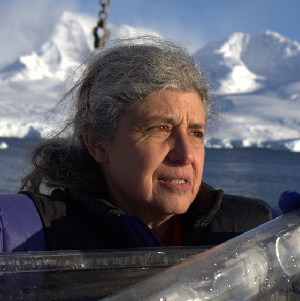
Photo by Maria Stenzel
Maria Vernet
Research Biologist, Scripps Institution of Oceanography
To share my love for nature and science, to interest others in scientific discovery and to encourage others to check new knowledge on the planet. We have a responsibility to know and preserve our environment as it feeds us, gives us the air we breathe and provides materials for shelter, making life possible.
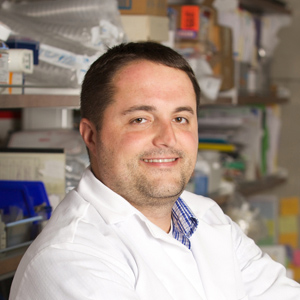
Adam Engler
Associate Professor, Jacobs School of Engineering
Because government-sponsored science is all around us: in our phones, GPS devices, medicines. Yet the benefits of our science and engineering research go only as far as the public appreciates it. I am marching to bring attention to all of the benefits of rigorous, peer-reviewed and repeatable science, and to emphasize that if government-sponsored science funding is decreased, regardless of agency, the benefits that the public see will also decrease. Aside from the societal benefits, the economic impact to our state would be devastating should research funding be cut.
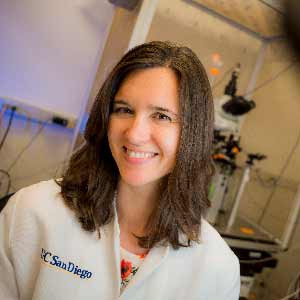
Photo by Erik Jepsen/UC San Diego Publications
Brenda Bloodgood
Assistant Professor, Division of Biological Sciences
Because the beauty of science is that it shows us how the universe and planet work, not how we wish it works. As we explore, we discover opportunities to improve health, foster communication, innovate our way to solutions for countless problems. Science has always been a driver of society: defining eras and triggering revolutions (agricultural, industrial, smartphones!). I am marching because I see the application of discoveries as a force for improving conditions on the planet; ignoring scientifically sound evidence is shortsighted and perilous. I want to express my support for rigorous, methodical, creative, and impassioned exploration. And most of all, I want those discoveries to be incorporated into the decisions that impact the health and well-being of humanity.
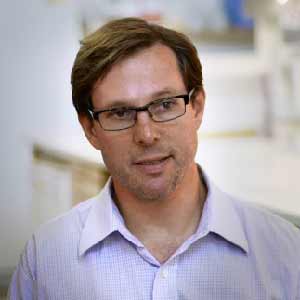
Jonathan Sebat
Professor, School of Medicine
Because I want the scientific enterprise to continue to advance knowledge, and to make discoveries that offer solutions to public health problems. I want to ensure that scientists are free to communicate the results of their research without undue influence from politics.
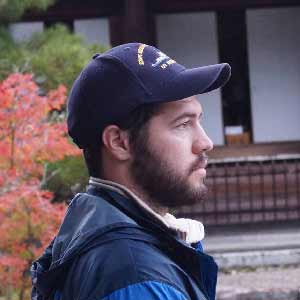
Dillon Amaya
Climate Science Graduate Student, Scripps Institution of Oceanography
Because, like so many other scientists, I am incredibly frustrated with the politicization of the physical and mathematical facts of climate change. This “debate” would not be so egregious if the stakes were not so high, but unfortunately the stakes are positively cataclysmic. We are simply running out of time, and the longer it takes to convince our government that 2+2=4, the less chance we have of reversing course.
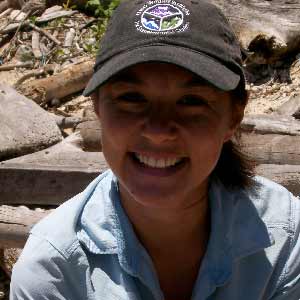
Maya deVries
Postdoctoral Scholar, Scripps Institution of Oceanography
Because science, discovery and the pursuit of truth are cornerstones of our society and our democracy. Science-based and data-driven policies are central to our government. I march because these core values are being questioned in a new and dangerous way.
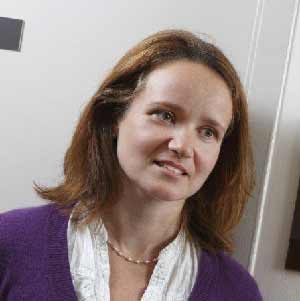
Sonya Norman
Associate Professor, School of Medicine
Because just 20 years ago we thought of PTSD as a chronic condition where people could manage the symptoms but never really recover. Now, thanks to science, we have evidence-based treatments that help many people recover from PTSD. I will be marching to advocate for continued funding to help cure and prevent illnesses and help improve the lives of people across the world in countless ways. I will also be marching in support of policy and governance that is based on scientific facts.
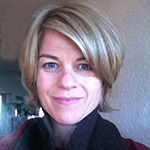
Nan Renner
Learning Scientist, Birch Aquarium
Because science seeks to understand how our world and the wider universe actually work. Science and technology make our lives better — from everyday weather predictions and internet searches, to extraordinary discoveries of new planets and ecosystems of microorganisms. Science saves lives, through modern medicine, studying the effects of pesticides, modeling our changing climate and more. Science, imperfect and always improving, powerfully creates new knowledge in response to present needs and the drive of human curiosity.
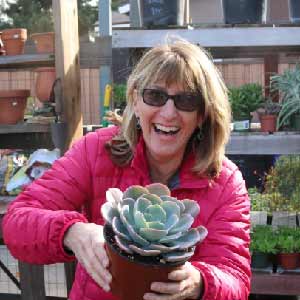
Elizabeth Rosenblum
Professor, School of Medicine
I am marching for the health and safety of our community. The greatest scientific achievement of the 20th century — vaccination — is minimized and even dismissed by those who either don't understand the science, or refuse to see it. Vaccines save lives, and we have science to thank for that.
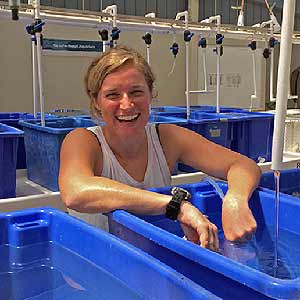
Lauren Nadler
Postdoctoral Scholar, Scripps Institution of Oceanography
Because we need to better understand how the world works in order to continue thriving on this planet and to ensure that its resources will be available for generations to come. These ideals are currently under threat, due to a misunderstanding of what scientists do and why they do it. We need to show that science is important to us and essential for people from all walks of life.
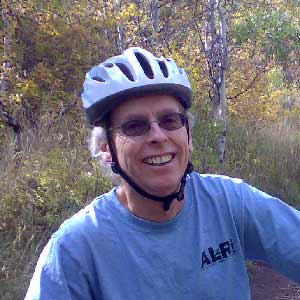
James Sallis
Distinguished Professor Emeritus, Distinguished Research Professor, School of Medicine
Because science is about searching for facts and valuing truth. I have spent my career developing evidence that can be implemented in policy and practice to improve health. I do not accept alternative facts or that we are in a post-truth era. My professional work and my personal values are under attack. If science loses, more people will die and suffer needlessly, undoing what I have been working for.
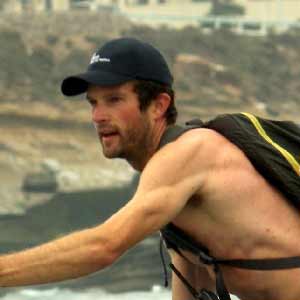
Photo by Rich Walsh
Philip Bresnahan
Senior Development Engineer, Scripps Institution of Oceanography
Because I spend every single day striving to learn more about the planet in order both to fully appreciate its wonders and to better understand how to protect those wonders for future generations. I march with the hope that we will have a loud enough voice to let people who are less familiar with science and scientists understand that all we want is to learn more about our world in order to make life the best it can be — both today and for many generations to come.
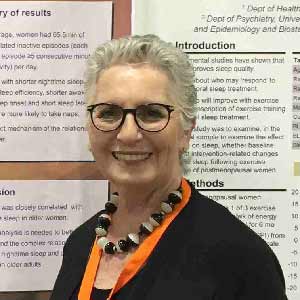
Sonia Ancoli-Israel
Professor Emeritus, School of Medicine
To show support for research, for truth, for evidence-based facts, for the National Institutes of Health, for the pursuit of knowledge. I will march as a scientist and one who is proud of it!
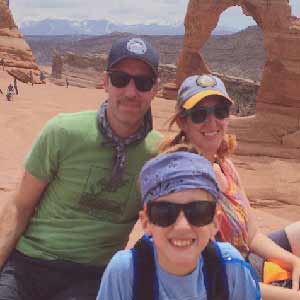
Garrett Eaton
Senior Export Analyst, Office of Research Affairs
Because science should not be politicized, and politicians need to hear from the public that we support policies and funding that advance science and protect our environment, based on scientific understanding, to ensure a better future for all humanity.
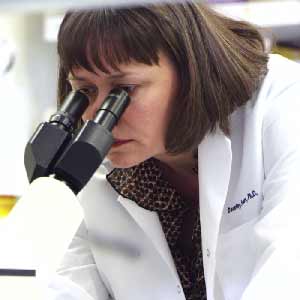
Dorothy Sears
Associate Professor, School of Medicine
Because science is critical for innovation in technology, medicine, environmental protection, engineering and other areas that make the world a healthier and more enjoyable place to live. Scientists and science have been getting poor press as of late and our efforts seem to have been devalued by those who control our resources and ability to deliver beneficial impacts on society. This unfavorable spin will have long-term detrimental effects on our future potential and our public image. I hope that we can portray a positive and convincing public and political message about the critical importance of science in our current and future lives.
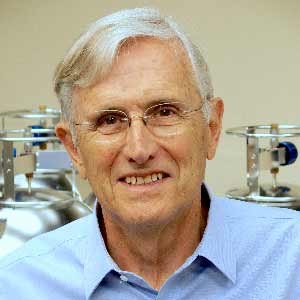
Ray Weiss
Distinguished Professor Emeritus, Distinguished Research Professor, Scripps Institution of Oceanography
Because we are in the midst of the undoing of The Enlightenment, the rule of reason that has governed the progress of our country since its founding. We must return to the path upon which greatness is actually based, and science must play a key role in that return.
Share This:
You May Also Like
Stay in the Know
Keep up with all the latest from UC San Diego. Subscribe to the newsletter today.


